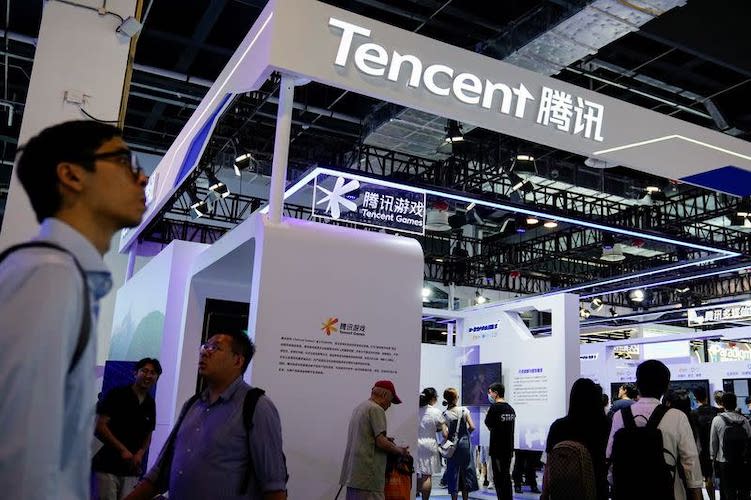Shares of Tencent and other Chinese gaming companies rose on Tuesday after an apparent turnaround by China’s gaming regulator on new rules aimed at curbing spending and rewards that encourage playing video games.
The proposed rules were removed from the National Press and Publication Administration’s (NPPA) website, which was inaccessible as of Tuesday morning, after having worked on Monday its website.
The consultation period on the rules, which sparked market turmoil when they were first announced, expired on Monday.
ALSO SEE: In New Comic, China Signals ‘Foreign Threat’ to its Rare Earths
The removal was described by analysts as unusual, with some saying a revision could be in store. The NPPA did not immediately respond to a request for comment on the reason for the removal.
Xiaoyue Hu, an analyst at Haitong Securities, said in a note to clients that removal of the announcement could signal “there might be further changes in the new measures.”
Hu said previous regulatory measures seeking opinions had a track record of staying on the government’s websites even after the consultation period ended.
Shares in Tencent Holdings, the world’s biggest gaming company, and its closest rival, NetEase, rose as much as 6% and 7% in morning trading respectively. The two companies’ shares were still up more than 4% at noon against a 2.4% increase in Hong Kong’s Hang Seng Index.
Spending limits for online games sparked panic by investors
The draft rules, which proposed setting spending limits for online games, had sparked panic among investors, wiping off nearly $80 billion in market value from China’s two biggest gaming companies when they were announced.
Analysts also at the time said the plans brought the risk of potential regulatory change back to the fore in the minds of investors, hurting confidence at a time when the government has been trying to boost private-sector investment to spur a slowing economy.
But five days later, the NPPA struck a more conciliatory tone, saying it would improve them by “earnestly studying” public views. Earlier this month, Reuters reported that China removed a gaming regulatory official from his post, in a move linked to the rules.
Two of the most contentious articles in the proposed rules were articles 17 and 18, analysts said. The NPPA acknowledged concern over those articles in December and analysts said there was a possibility they could be removed or changed.
Article 17 seeks to ban video games from forcing players into combat, which confused the industry as combat is the key mechanic of the majority of contemporary multi-player games.
Article 18 requires games to set a spending limit for players as well as barring features that incentivize players to spend in the game.
“Our base-case view expects the government to remove Article 17 (prohibition of mandatory player-versus-player) and 18 (imposing spending limit) from the final rule,” Ivan Su, an analyst at Morningstar, said.
Charlie Chai, a Shanghai-based analyst at 86Research, said regulators have been working to contain the fallout of the proposed rules.
“It seems (government) officials were caught off-guard by the overwhelming negative reaction from investors, businesses, and the public,” he said, adding that the government has since “moderated its stance (and labelled) the proposal as ‘negotiable'”.
Another factor in the rebound of Chinese shares on Tuesday may have been a report that Beijing is considering a ‘rescue package’ to boost local markets.
- Reuters with additional input and editing by Jim Pollard
ALSO SEE:
China Gaming Stocks Rise as Official Axed in Rules Turnaround
Tencent Pouring Resources Into Big Budget Console Games
China Proposes Eight-Minute Limit on Smartphone Use by Kids
Beijing’s Crackdown Wiped $1.1 Trillion Off Chinese Big Tech
Tencent Seen Aiming at Majority Stakes in Foreign Gaming Firms
Approvals Signal an End to China’s Gaming Crackdown
China Videogame Sector Reports First-Ever Drop in Revenue
China Slashes Online Gaming to Three Hours a Week for Young People
Tencent Curbs Video Games After State Media Calls Them ‘Spiritual Opium’
























